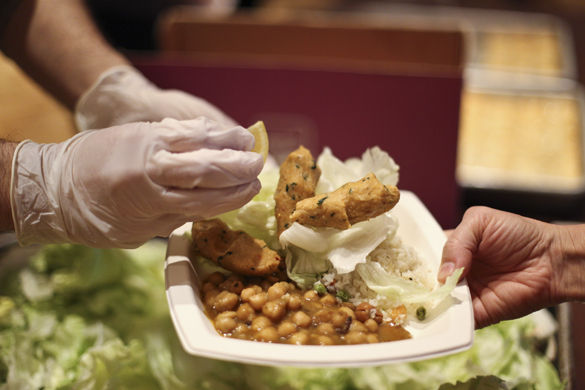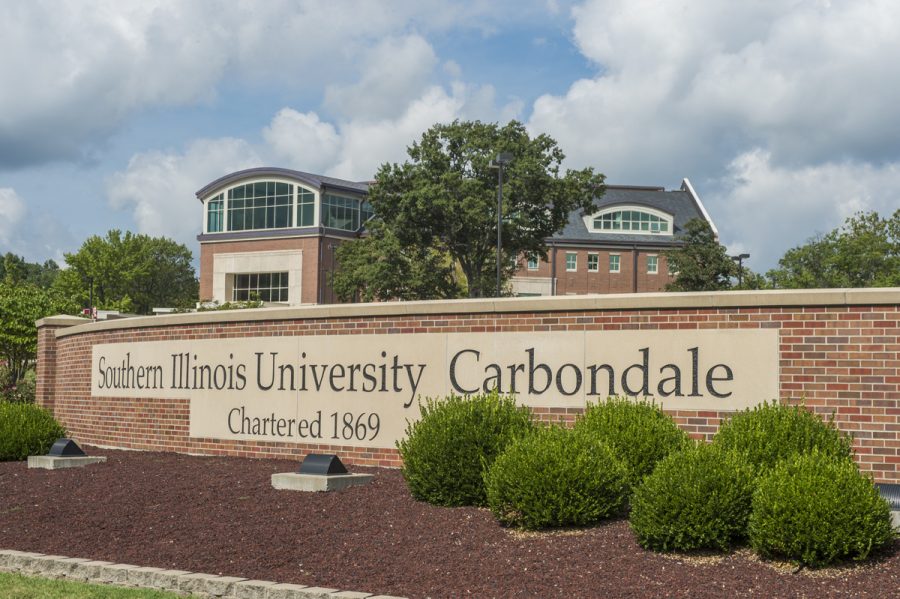Salukis for sustainability: Dining halls strive to reduce environmental impacts

Nurcan Gumus, then a graduate student in linguistics from Turkey, places a lemon next to lentil balls on the plate of an attendee Wednesday, Feb. 10, 2016, at the International Food Fair at the Student Center. (DailyEgyptian.com file photo)
August 31, 2016
A November “waste audit” found 1.75 ounces of food per person each day were being wasted in the dining halls, a university official recently said.
Peggy Connors, the associate director for housing, said the dining halls serve approximately 5,000 meals to students per day, and last semester, 1,095 pounds of food from Trueblood and Lentz dining halls were sent to the university’s compost facilities on a daily basis.
Geory Kurtzhals, SIU’s Sustainability Coordinator, said the university is on top of the issue.
Advertisement
“Our dining team is very aware of sustainability and conscious of it on a daily basis,” she said. “We don’t want to waste food because it has nutritional value and there are people that are going hungry.”
When students were finished eating during the November audit, instead of sending their plates of food scraps down the conveyer belts into the kitchens — out of sight, out of mind —leftovers were scraped into containers, weighed and recorded for all to see, she said.
“It just created awareness for students that all of this food is nutritional food that someone else could consume and we should be aware of the amount that we’re taking,” Kurtzhals said.
Though college students may have a reputation for having large appetites and the all-you-can-eat dining hall setup may seem like a recipe for squandered sustenance, Kurtzhals said the buffet-style formula of the dining halls is a positive in-waste elimination efforts.
“It doesn’t mean that people have to fill their plates and take lots of food. What it really means is students can just take a little bit, see if they like it — and if they like it, then they can go back and get more,” Kurtzhals said. “Or if they don’t like it, then they don’t have a certain quantity that’s already been put on their plate.”
But, Kurtzhals admitted food waste does still happen.
“No matter how much you plan and how much you try to decrease it there’s always going to be food waste — but that goes to our composting facility,” Kurtzhals said. “Ideally, we’d have zero waste. However, that’s very difficult when you’re trying to provide customer service to students.”
Advertisement*
After trying to reduce waste, the next step is composting the waste that remains.
“All of the food waste from preparation, like potato peelings and things, and any food that students have leftover, down to the chicken bones — everything gets used by the composting facility,” Karen Midden, associate dean in the College of Agricultural Sciences, said. “It’s state-of-the-art, especially for a university to have such a sophisticated one.”
The 1.75 ounce was then divided into pre- and post-consumer waste statistics.
The pre-consumer waste, which are the preparatory scraps that come from the kitchens, was found to average 2.2 ounces per day last semester. The post-consumer waste sent to compost, which is the food leftover from diners, averaged 1.3 ounces per day.
Upon the introduction of the composting system last semester, the dining halls were able to greatly reduce their garbage pick-up.
Bill Connors, executive chef for SIU’s dining halls, said this composting system is a cycle that will give back to the university.
“The scraps from the preparation side of things get turned to compost, and then we have all that beautiful fertilizer, which they’re going to use on the plants — not only the vegetable plants, but the flowering plants all over campus also,” Connors said.
Connors — better known as “Chef Bill” around campus — also emphasized the efforts made by the dining halls to have food supplied from local farms and sustainable companies.
“If a company is more sustainable we’ll throw more business their way just because of that,” he said. “We’ve worked with our [agriculture] department in creating a number of projects like using local pork that they raise on campus when it’s available.”
Connors also detailed his involvement with the Local Gardening Initiative of Carbondale, a student initiated and operated garden on campus that supplies a portion of the produce consumed in the dining halls.
The student garden started out in 2009 with only four small garden beds and has since grown into a plot of nearly five acres of land to meet the demands of the dining halls, Connors said.
It is prohibited for the dining halls to donate unused food to shelters or soup kitchens, he said, but that may change in the future.
“The students pay for the food, so we’re not allowed to donate it,” he said. “But apparently some of the other universities have gotten around it, so we’re in the process of figuring out what we have to do to get that provisional to do that also.”
Staff writer Marnie Leonard can be reached at mleonard@dailyegyptian.com or on Twitter @marsuzleo.
To stay up to date with all your SIU news, follow the Daily Egyptian on Facebook and Twitter.
Advertisement








